
COP27 Recap: Slow but needed progress
Clean Air Task Force set out for COP27 in Egypt to help spur a shift in awareness among world leaders and climate advocates that the time has come to reassess the scale and complexity of the climate challenge. Amidst a global polycrisis and skepticism surrounding COP27 our team of experts was able to deliver evidence-based findings, convene diverse groups of stakeholders and fuel more realistic and pragmatic narratives, and provide opportunities for delegates, activists and observers to gain a new understanding of climate action — one that acknowledges the importance of the developing world, that prioritizes implementation and action, that elevates the role of energy security, that works to quickly reduce both carbon dioxide and methane emissions simultaneously, and that understands we must advance a diverse array of technologies and bold policies to allow for more options, not fewer.
- We saw efforts and incremental progress being made on many fronts. COP27 negotiators reached the first-ever agreement on loss and damage — establishing a fund to support countries harmed by climate change’s impacts. This marked a clear shift towards a new vision for Africa centered on indigenous innovation, energy access, systems transformation, and economic development as a first line of defense against climate change.
- In the context of a looming energy and climate crisis, the final COP27 text reflected the urgent need for decarbonization of hard to abate industries and technology optionality, including through financing and systems transformation.
- Several countries announced steel-in-the-ground initiatives to turn climate ambition into action, including a carbon dioxide removal launchpad, energy partnerships to advance low-hydrogen development, and a program to accelerate the transition of coal-fired power plants to small modular nuclear reactors in Europe.
- Small coalitions, both private and public, seeded important technology and market partnerships that will support the deployment and scale-up of advanced technologies beyond just wind and solar.
- Finally, world leaders reported significant progress on methane mitigation under the Global Methane Pledge, including new methane standards from the U.S., Canada, Nigeria, and Ecuador.
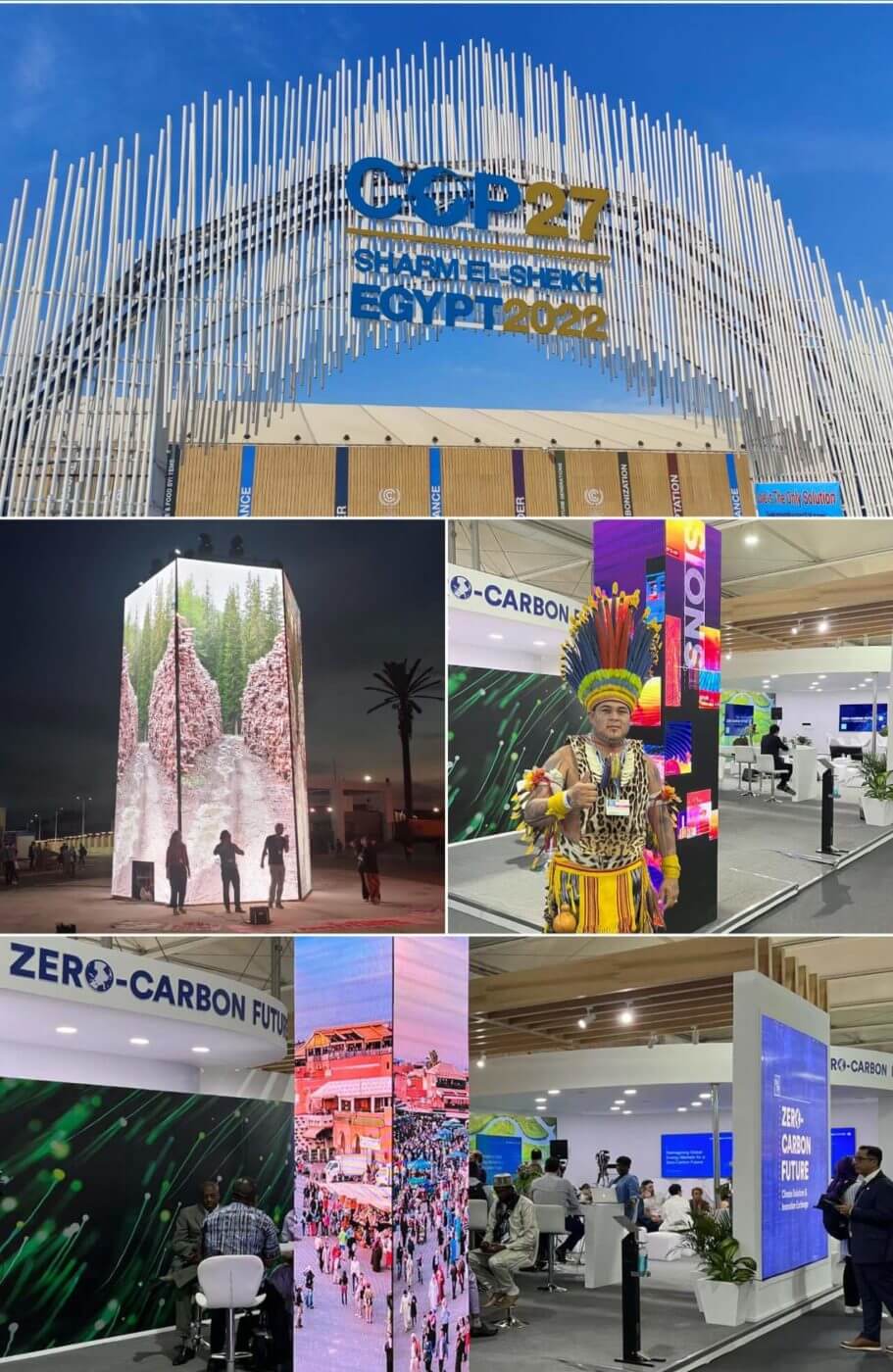
As we reflect on the role we were able to play at this year’s conference by hosting the Zero Carbon Future pavilion and multiple convenings and side events, we look forward to enhancing our abilities to engage global leaders and ensure accountability and continued progress on each of these fronts in the coming year is made. 2022 has shown that the path ahead is going to be even more challenging and the need for ratcheting up ambition and taking bold action in the lead-up to COP28 in the United Arab Emirates is not optional, but essential for the success of any long-term strategies.
CATF’s COP27 Highlights & Achievements
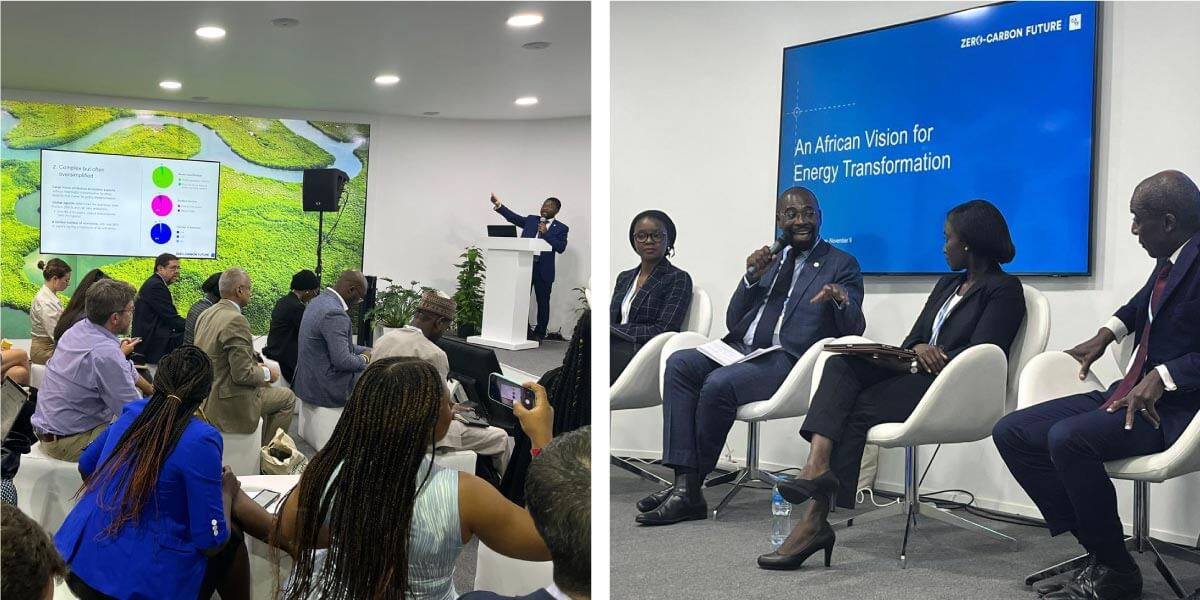
Centering African Leadership
This year at COP27, for the first time we felt the presence of African leaders who asserted their role as active participants within the climate conversation, voicing their self-determination and making clear that they will chart their own energy transformation pathways. Government officials, attendees and industry experts were asked to recognize that the energy transition must be considered within the realities of Africa’s development imperatives, and to reckon with the fact that economic development is a key driver of the many intersections — including energy access, energy security, population growth and geopolitical shifts — in which we must consider climate action globally.
Under the leadership of Lily Odarno, CATF’s Director of Energy and Climate Innovation in Africa, CATF provided a platform for open and robust conversations guided by a new innovative vision for Africa that relies on indigenous endowments, entrepreneurship, youth activation and inner and cross-regional collaboration. Our African team of experts presented findings, analysis and created opportunities for broader understanding and awareness of the scale, context and region-specific complexity of the climate challenge while advancing the need for new approaches we need to address it.
Speaker Panels & Event Recordings
- Modeling Africa’s Energy Transition: Leaders at African think tanks, universities, and governments discussed the lack of representation in scientific research and the ways we can foster knowledge generation that aligns both regional development imperatives and climate action. Read more here.
- An African Vision for Energy Transformation: Hear from leaders across Africa building an African vision for energy transformation, ensuring local ownership and use of regional endowments and self-determination within a global vision for decarbonization.
- Financing Africa’s Climate Agenda: Africa Policy Research Institute presented its new report on Climate Finance in Sub-Saharan Africa, followed by a panel discussion with technical experts on how existing global and national climate finance architecture can better respond to African countries’ climate agenda.
- Africa Carbon Management Center for Excellence Reception: Nigeria and CATF held a reception in the Zero-Carbon Future pavilion to launch and celebrate the new Africa Centre of Excellence for Carbon Management Technology and Innovation, with special guests Chief Henry Ikoh, Minister of State for Science, Technology, and Innovation, Nigeria and Assistant Secretary Brad Crabtree, U.S. Department of Energy.

Scaling Zero-Carbon Technologies for a Clean Energy Transformation at COP27
CATF’s leadership at the nexus of EU, U.S., and African energy work, led to CATF’s Senior Director, Europe and Chair of CATF’s COP27 Committee Lee Beck to be selected as a moderator of a high-level panel with Executive Vice-President of the European Commission Frans Timmermans, U.S. Secretary of Energy Jennifer Granholm, and Presidential Economic Advisor and Green Hydrogen Commissioner at the Government of Namibia James Mnyupe.
Their discussion addressed the challenge of building new technologies and infrastructure at massive scale. From investments in clean tech to diversifying partnerships and focusing on energy security, the panelists highlighted the need for multiple solutions to help meet the climate challenge.
Secretary Granholm underscored the importance of climate policy: “Since the Inflation Reduction Act was passed, we’ve had companies announcing $30 billion in clean energy projects to tap into those tax credits. This is helping us create that industrial backbone to increase our energy security. It’s tech agnostic so long as it’s zero-carbon.”
Executive Vice-President Timmermans also emphasized the need for energy security: “In Europe we’ve been bitten by reliance on Russian oil and gas. It won’t happen again. We don’t have our own fossil fuels at the scale others do, so now the only way we can increase our sovereignty is to increase clean energy.”
Commissioner Mnyupe spoke on the innovative approaches Namibia is taking in clean energy deployment and the need for more robust global partnerships: “Partnerships don’t always need to come in the form of complex documents or billions of euros, but they sure do help. We’ve mobilized more than $130 million in climate finance. Without the EU working with us, we wouldn’t have been able to do what we’re doing.”

World Leaders Show Momentum on Methane at COP27 Ministerial Co-Hosted by CATF
World leaders, led by the U.S. and EU, demonstrated significant momentum toward achieving the goals of the Global Methane Pledge today at a COP27 ministerial meeting on methane, co-hosted by Clean Air Task Force.
Jonathan Banks, CATF’s Global Director for Methane Pollution Prevention, was invited to moderate the event, in which U.S. Special Presidential Envoy for Climate John Kerry and Executive Vice-President of the European Commission Frans Timmermans celebrated a year of progress and challenged more counties to turn ambition into action.
“Together we challenge every country to return at COP28 with a concrete methane plan, with methane in their NDC and action along our methane pathways,” Kerry said.
Timmermans added: “Our focus must now be on implementation. We’ve made progress to turn a niche technical issue into a movement, and now we must invest in the infrastructure needed to reduce emissions, to improve our accounting, and to form new partnerships to reduce emissions across the major emitting sectors.”
China’s special climate envoy Xie Zhenhua made a surprise appearance, highlighting China’s commitment to reducing methane emissions and sharing that a national methane mitigation plan was currently in administrative and legislative review.
Setting the stage for a collaborative climate and innovations exchange at the Zero-Carbon Future pavilion
CATF experts and partners joined forces at our COP27 Zero-Carbon Future pavilion where climate advocates, government officials, industry leaders, and experts from around the world took on the hardest climate and energy questions, shared innovative solutions, and highlighted the urgency and opportunities we have to transform the energy system and decarbonize the global economy as a key step towards addressing climate change.
We hosted over 30 events and panels and featured two weeks of thought leadership, timely programming and diverse set of discussions focused on advancing a more innovative, region-centric, and pragmatic vision for an emissions-free, high-energy world.

Innovation and Technology to Protect Against Climate Impacts
The breadth, depth and complexity of the global climate challenge has been put on display at COP27 — underlining in bold that we will need a flexible, inclusive, and pragmatic approach. One size will not fit all.
At CATF’s Zero-Carbon Future pavilion, U.S. Environmental Protection Agency (EPA) Administrator Michael Regan and some of the U.S.’s most respected environmental justice experts, including the father of the environmental justice movement, Dr. Robert Bullard, gathered to discuss the role for innovation and technology to mitigate climate impacts on marginalized communities.
Watch: Leveling the Playing Field for Environmental Justice
With health at the core of climate change, addressing global warming isn’t just about reducing carbon emissions, but about protecting people everywhere and ensuring no one is left behind in the clean energy transition. At a co-hosted CATF and Google event, experts discussed the current hurdles we face to improving health and building resiliency in the face of climate change, and how we can harness the power of public-private partnerships to address them.
Watch: Addressing the Health Impacts of Climate Change through Public-Private Partnerships
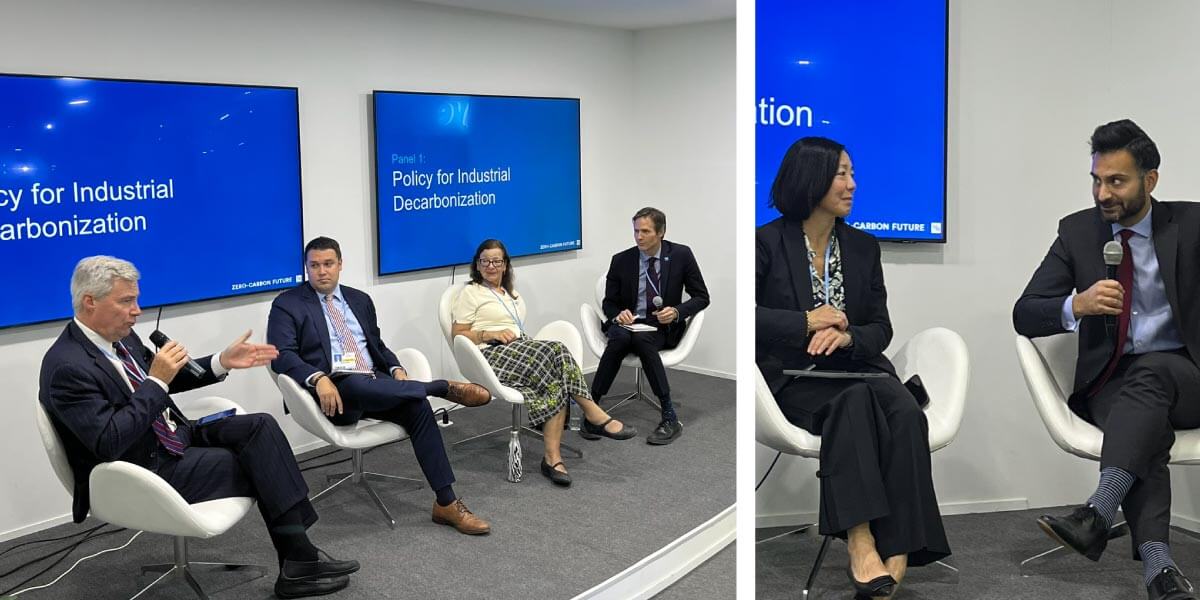
Envisioning the Future of U.S. Climate Action
Over the past two years, the U.S. Congress has passed a series of historic bills that will collectively unlock hundreds of billions of dollars in investments in climate and clean energy solutions. As the current Congress draws to a close at the end of 2022, U.S. leaders are looking ahead to identify opportunities to spur deployment of advanced carbon-free energy and climate technologies and support durable climate policy in support of global efforts to fight climate change.
Senator Sheldon Whitehouse; Representatives Kathy Castor, Suzanne Bonamici, Sean Casten; and White House National Climate Advisor Ali Zaidi joined us for a discussion with leaders from U.S. industry to explore promising pathways to U.S. climate leadership in the coming years, reflecting on recent efforts to pass the bipartisan Investment and Infrastructure and Jobs Act and highlighting new opportunities for progress.
Watch: The Future of U.S. Climate Action
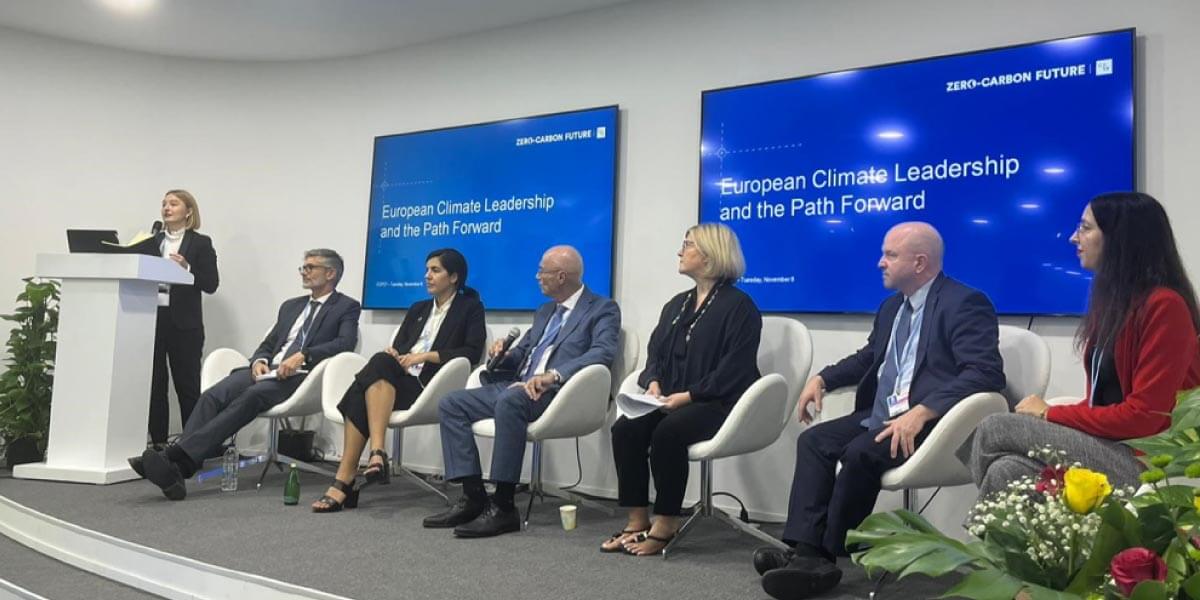
Advocating for a Suite of Climate Solutions in the EU
At three separate events, CATF convened European government, energy, and finance leaders to discuss European climate leadership and the need for immediate and long-term investments in a diverse set of carbon-free technologies.. Representatives from Denmark, Germany, Greece, and Luxembourg highlighted the issue of energy security and its impact on the EU’s climate agenda, with a focus on the need to pursue multiple climate solution pathways at once to better protect against unforeseen risks in the future.
Watch: European Climate Leadership and the Path Forward
While the European Union is committed to achieving net-zero emissions by 2050 as a bloc, within that bloc is a diverse array of economic, geopolitical, and cultural circumstances. Our second event focused on the unique positions of Southern, Central, and Eastern Europe, and the need for an expanded set of decarbonization pathways and inclusive climate solutions that allow each region or country to chart their own path to decarbonization. CATF also co-hosted a panel with partners Bellona on the next steps for German industrial decarbonization, highlighting the pressing need for transformative investments, technology-openness, and the need for a German carbon management strategy.
Watch: Pathways to Decarbonization in Southern, Central, and Eastern Europe
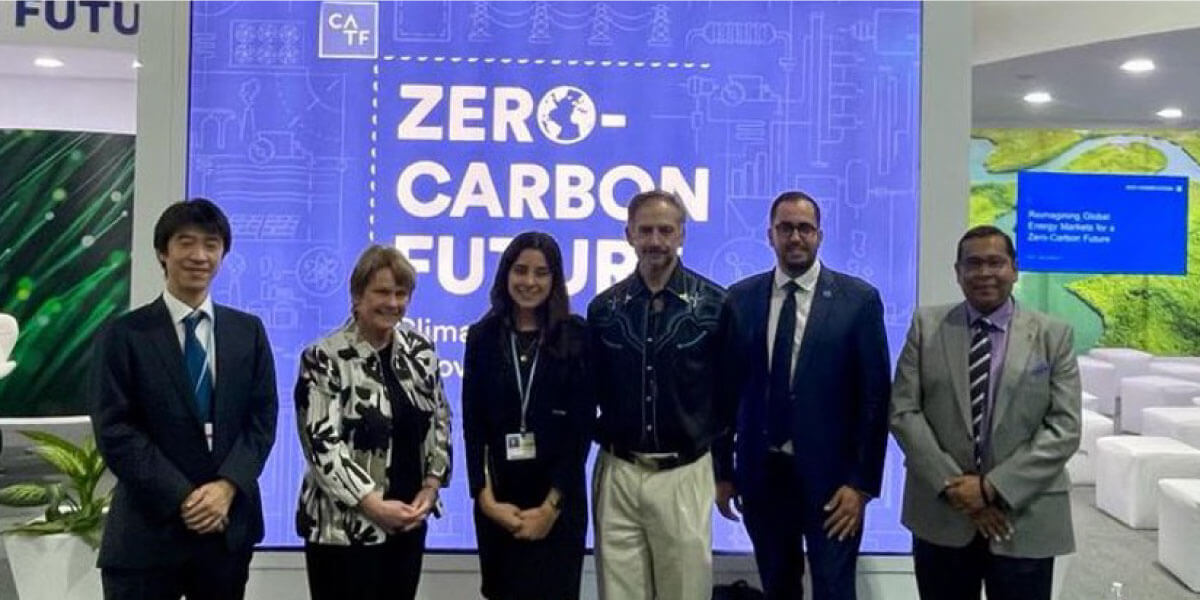
Reimagining Global Clean Energy Markets
Global energy experts joined CATF at two events to discuss the opportunity, policy, and market conditions needed for the Middle East and North Africa (MENA) region to become a global decarbonization hub. Global low-emissions hydrogen demand is set to skyrocket in the years to come, presenting nations heavily reliant on oil and gas economies with a key opportunity to transform their production streams and lead as global zero-carbon fuel suppliers — while regions like Europe can send important early demand signals with strong regulatory standards and best practices. Stakeholders from industry, government, and civil society discussed a new vision for a decarbonized, secure, global energy market — and what is needed to establish a global energy market for a zero-carbon future.
Watch: Reimagining Global Energy Markets for a Zero-Carbon Future
Following this discussion, representatives from KAPSARC, the World Bank, and the Hydrogen Council convened to explore how the Middle East and North African regions can seize the opportunity before them and transform themselves from suppliers of unabated fossil fuels into a climate-forward, global exporters of abundant clean energy.
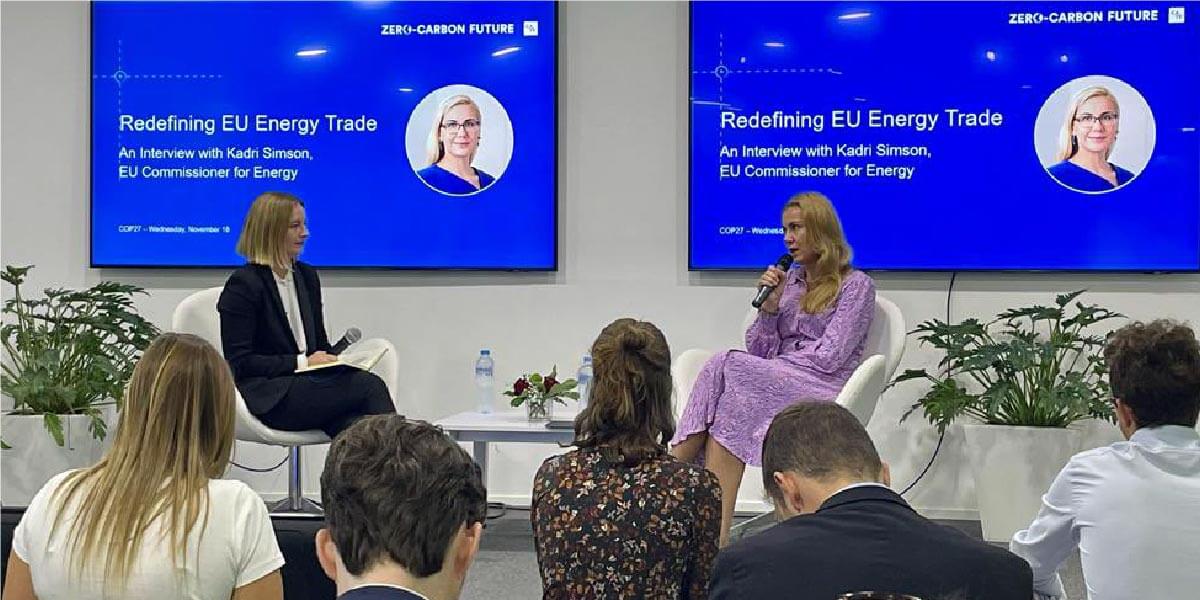
Redefining EU Energy Trade and Partnerships: A Conversation Between Kadri Simson and Lee Beck
The mounting energy crisis has made clear that the European Commission must advance climate action with an eye towards energy security, ensuring that the two goals strengthen one another. In an exclusive interview on the Zero-Carbon Future pavilion stage, European Union Commissioner Kadri Simson and CATF Senior Director for Europe Lee Beck discussed Europe’s vision for climate action in a complex world, covering energy trade and global energy partnerships — tackling the hard question of how Europe can ensure both emissions reductions and energy security.
Watch: Redefining EU Energy Trade and Partnerships

Superhot Rock Energy: Tapping the Heat Beneath our Feet for Always Available, Carbon-free, Renewable Energy
At CATF we believe that superhot rock energy is a visionary energy source deserving of investment, and yet almost entirely unrecognized in the decarbonization debate. CATF’s Superhot Rock Energy Program Director, Terra Rogers, provided an overview of this groundbreaking technology, noting that with the right funding and policy support, it could revolutionize the global energy system for generations to come by providing cost-competitive, carbon-free, always available, renewable energy with low land use requirements.
Watch: Superhot Rock Energy – Always Available, Carbon-Free, Renewable Energy

Zero-Carbon Fuels to Decarbonize Global Energy
Today, fuels are an important part of the global energy system, with 80% of the world’s energy coming from unabated fossil fuels. This will likely remain for several decades, as they are needed for the parts of the system that are the most challenging to change: heavy industry like cement and steel, and heavy transport. This means switching from fossil fuels to decarbonized alternatives, such as hydrogen and ammonia produced through climate-beneficial pathways.
At the Zero-Carbon Future pavilion, CATF and industry experts participated in discussions on how to scale and build the global market for zero-carbon fuels, catalyze cost-effective hydrogen imports in Europe, and what will be needed to create global hydrogen hubs.
Event recordings:
- Unlocking Hydrogen: Pathways to Generating Clean Hydrogen at Scale and Building the Global Market for Zero-Carbon Fuels – With expected increase more than 500% by 2050, our panel of global experts discussed how to advance clean hydrogen production through a variety of technologies.
- Catalyzing Cost-Effective Hydrogen Imports in Europe – Europe will not be able to produce all the low-emissions hydrogen fuel it will need to decarbonize at the necessary pace and scale. Experts discussed how we can facilitate the cost-efficient, climate-beneficial transport of low-emissions hydrogen fuel to Europe.
- Global Hydrogen Hubs: Why We Need Them and How We Can Get Them Right – Learn how global hydrogen hubs can catalyze clean hydrogen generation at scale while matching supply with demand in many hard-to-electrify sectors.
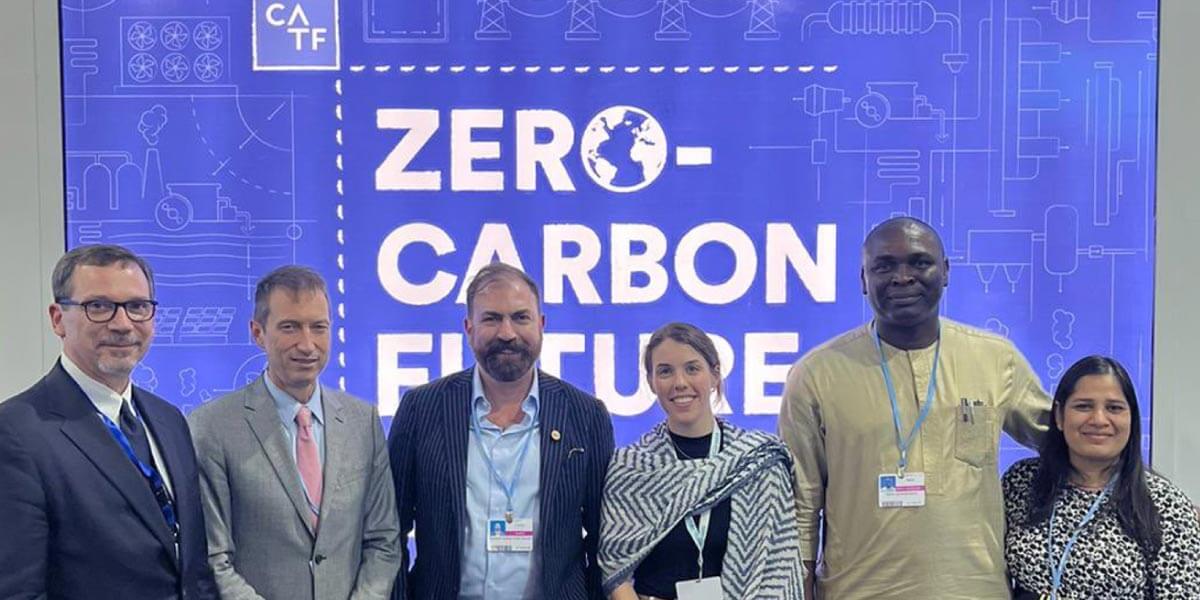
From Moment to Momentum: What Methane Leadership Looked Like at COP27
The COP27 methane ministerial demonstrated significant momentum toward achieving the goals of the Global Methane Pledge, and our methane team was on hand to highlight that progress at events held at the Zero-Carbon Future pavilion. From a focus on financing to reduce methane emissions, to tackling methane pollution in the Americas and highlighting the importance of data in methane mitigation, we showcased how countries with concrete plans, standards, and policies can effectively cut methane and curb the rate of global warming.
Event recordings:
- Jump-Starting Methane Finance to Realize the Global Methane Pledge – Experts convened to identify opportunities for financial institutions to increase funding support and investments in methane mitigation, highlighting how cross-cutting capacity investments can accelerate action now.
- Ambition to Action: Tackling Methane Emissions in the Americas – Climate leaders from across the Americas discussed commitments made so far to cut methane, and the barriers we must overcome to jump-start global progress to achieve the goals of the Global Methane Pledge.
- Measure and Manage: How Science and Data Can Spur Action to Cut Methane – CATF was joined by the Environmental Defense Fund (EDF), Rocky Mountain Institute (RMI), and Carbon Mapper for a panel discussion on how data can help leaders around the world cut methane.
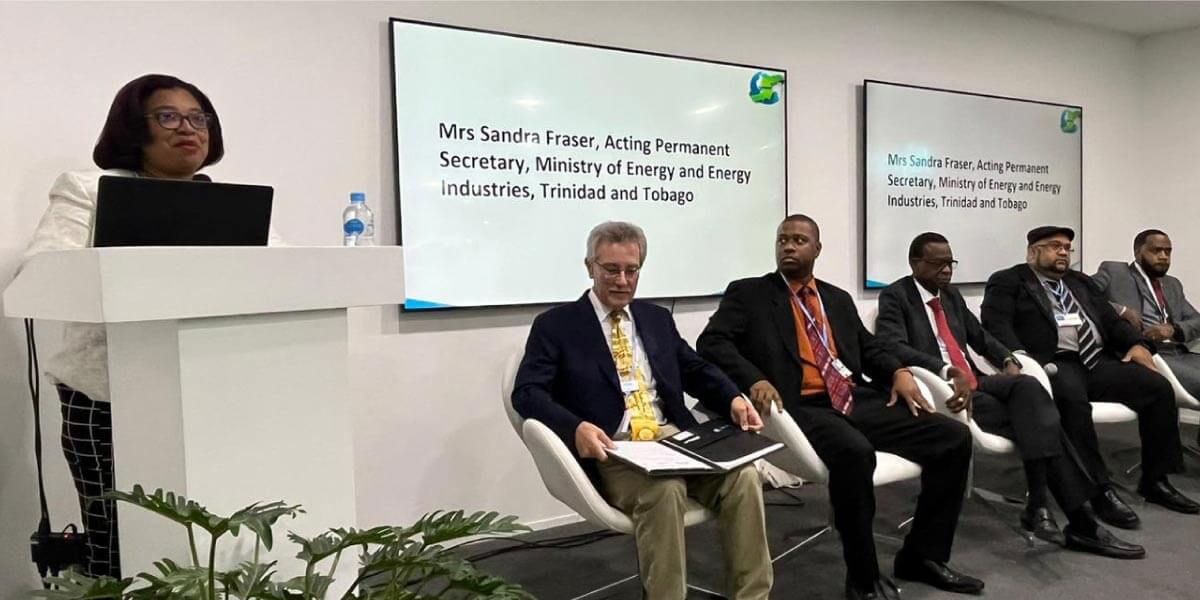
Advancing Carbon Capture and Storage Strategies
During a series of events at the Zero-Carbon Future pavilion, carbon capture and storage experts and policymakers focused on regional carbon capture strategies, unlocking carbon capture finance in developing countries, and carbon dioxide removal. These events aimed to reveal how regulation and policy incentives can help carbon capture scale, and for the urgent need to commercialize this critical climate technology globally.
Event recordings:
- Regional Carbon Capture Strategies in the U.S., EU, and Beyond – Special guests U.S. Department of Energy Assistant Secretary Brad Crabtree and KAPSARC President Fahad Alajlan highlighted the need for carbon capture and storage and what is needed for a scaled global buildout.
- Unlocking Carbon Capture Finance in Developing Countries – Experts discussed why these technologies will be critical for developing economies to decarbonize, and how international financial institutions can help drive rapid deployment.
- Carbon Capture and Storage in the Caribbean Region – Trinidad and Tobago and Guyana took the Zero-Carbon Future stage to share their progress on developing carbon capture and storage in their countries, and what can be learned from their experiences.
- A New Approach to Carbon Dioxide Removal – Carbon removal experts from the German Institute for International and Security Affairs, Carbon Engineering, and Bellona, discussed how a new approach to carbon removal can more effectively move us towards our climate goals.

A Spotlight on Nuclear Energy at COP27
CATF highlighted the versatile value of nuclear energy at two distinct events at the Zero-Carbon Future pavilion. Global experts joined CATF’s Global Nuclear Energy Strategy Director, Carlos Leipner, to discuss key opportunities and challenges around transitioning power plants from coal to nuclear power — including its impacts on jobs, pollution, and local economies. World leaders and energy experts also discussed how to advance nuclear hydrogen — a promising pathway to generate enough hydrogen to meet demand in a climate beneficial way.
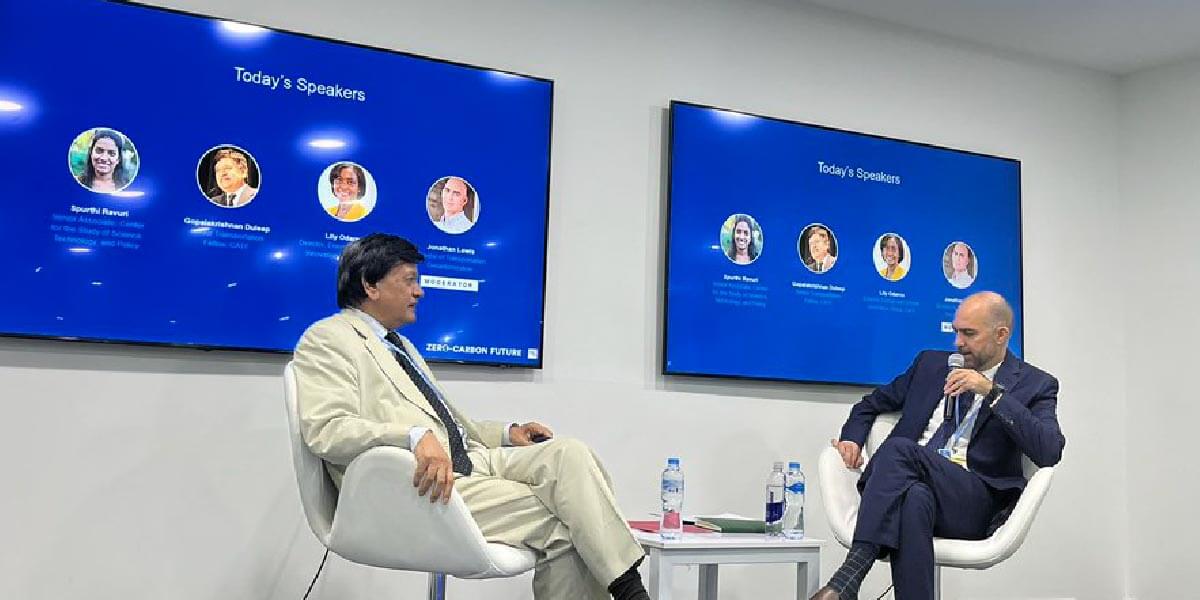
Tackling the Challenge of Decarbonizing Transportation
“Just because aviation is one of the hardest to decarbonize sectors does not let us off the hook. It can be done and it must be done.”
CATF’s Director of Transportation Decarbonization, Jonathan Lewis, underscored the challenges of decarbonizing transportation, including aviation, heavy-duty trucking, and marine shipping, and joined experts in highlighting the opportunities for progress in each sector in a series of events at the Zero-Carbon Future pavilion.
Event recordings:
- Decarbonizing India’s Transport Sector: How Emerging Economies can Reduce Transportation Emissions Now – Experts on transportation from India and other emerging economies joined CATF for a discussion on how to drive down transportation sector emissions in India over the next 10-15 years.
- Beyond Biofuels: What it Will Take to Decarbonize Aviation – A discussion on the unique needs for decarbonizing aviation, and how governments around the world can help get us there.
- How Transnational Cooperation Can Enable Global Decarbonization in the Marine Shipping and Aviation Sectors – Special guests Member of the European Parliament Jutta Paulus and U.S. Department of Transportation Deputy Assistant Secretary Andrew Wishnia joined CATF to discuss how transnational cooperation can enable global decarbonization.
As we look ahead to COP28, we plan to focus on long-term climate-management strategies that are driven by region-centric and cross-sector approaches to policy change, market facilitation and transformation. Through technology development and deployment, industrial decarbonization, and systems thinking we can address the economic realities of the world in the context of climate change as a chronic condition. CATF looks forward to working with global leaders to ensure accountability and continued progress on each of these fronts in the coming year — building on the progress made at COP27 and ratcheting up ambition and action in the lead-up to COP28 in Dubai, UAE.


